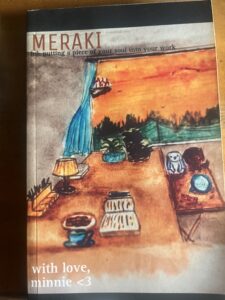A BOOK REVIEW BY AMANITA SEN
The back cover page of her book “Meraki“ has these words on it.” I hope you liked the book and I hope you felt the hug I sent you.“
As if in an intimate conversation with her readers, the poet makes it clear on what could be expected from her book and what better than a warm hug could be promised by the poet herself? The readers soon realise that it is a special voyage they are in, with Rukmini’s book “Meraki’.
“ I could tell you a
hundred stories of
righteous men born
of salted wounds”
Place in your calloused palms
a bouquet of million torn petals
broken with grief and hope
and yet
I would never find you
in the places I lost you.”
Her imageries are sharp in what they denote yet they come with the tenderest expressions like “ salted wounds” and “calloused palms”. The compassion feels so evident in the tone of the lines like they know the hearts stricken with misery really well.
Poetry is so much about seeking solace and catharsis in words that burst from the immensity of the perceptions of our experiences.
“ I am wound up today,
Tight like the coils around my neck.
Breathless, like the dead noose
around my heart
I am tethered today
heavy like the stale air
in my lungs.”
With these lines, it all comes alive for us those times we have felt broken, with no respite in our sight from the sufferings. The poet befriends the readers by exposing to them to her own vulnerabilities. The words ring true for all who are familiar with similar feelings of dejection and loss.
The young poet talks of pain and sufferings like she knows them for long.
“ Do you hold funerals for the broken-off parts of you too?”
So much is said in this one-liner poem. Funerals imply the necessary closure for all those moments perhaps, when one feels difficult to carry on. If each dissociation came with the respite of a good ending, would it not be easy on mankind, psychologically speaking? Brevity at its best, it is as if the poem looks eye to eye at human’s existential crisis.
“ The water is lighter on my tongue
so strange and so familiar .
My home remembers me.
The embraces are just
that much more precious.
My home remembers me.“
“ The voices in her head
whispered no more as a train
whistled past, bathing her
in the light of Goddess.
For that was who she was,
another brave immortal
soldier treading on
her deserted station,
waiting for the last train
to take her away,
take her home.”
Clearly the poet provides with pointers at the places of repose when life’s challenges overpower us. Home is not just a place but also a feeling to resort to, for the necessary pause in the journey to seek comfort, to be healed.
How does poetry help us? Have we all not paused to ponder on its role of sustaining our souls when life overpowers us with unforeseen challenges? The poet says,
“ To understand poetry,
one must be intimately acquainted
with the tongue of pain
For it is only when I am
rendered speechless,
that I turn to the ink
The pages caress my pain
and they feel so warm and motherly.”
An important theme that marks Rukmini’s poems is “motherhood“.
In one of her poems she questions
“ Who is a good mother?”
Is she born of wounds?
Does she know to shield
her child from them?”
In this complex world, motherhood doesn’t come with age old narratives of her being the provider of safety and comfort and that could be the reason why the poet asks,
“ and stabs needles of hatred
in her child? Does she call it love?”
Does she pamper her child
or does she prepare them ?
Who is a good mother?”
The onus often falls upon poetry to ask pertinent questions like this. One can be hopeful, that the query itself can open a floodgate of possibilities with the overhauling of the concept of the new age motherhood and its ramifications on the societal structures.
There is a distinct lyrical quality in some of these poems .
“ How old is old enough?”
“ How strong is strong enough?”
The lines could come alive as refrains from a song that holds the underlying message with a frankness that bewitches the reader in a way good art forms do. They become a transformative experience for the reader.
The poet explains the title “Meraki“ that means putting a piece of your soul into your work and one feels that it completely lives up to its meaning. Direct in their voice but soulful in their intent,the poems softly but surely leave a lasting impact on the readers.
With careful reading, the poems come across as expressions of raw emotions. One wanders what if these feelings had more time to seep in more reflections and imprints that life leave upon us. This being the first volume of poetry from Rukmini, it can be said with surety that here’s a poet to look out for, in the future.
Also read, The Three Body Problem, a book review by Soham Guha and published in The Antonym:
Follow The Antonym’s Facebook page and Instagram account for more content and exciting updates.




























0 Comments